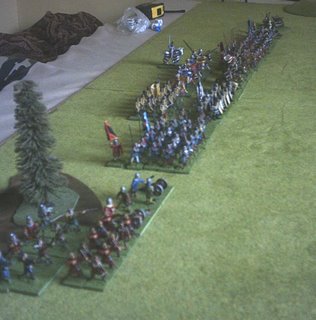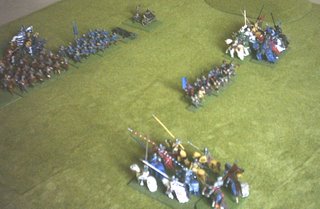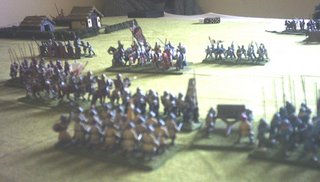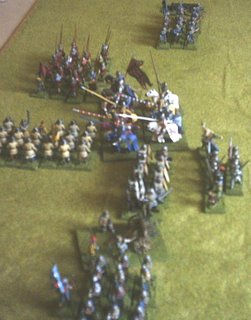Are always enlivened by a game, even if it is necessary to run a solo battle.
As my last game had shown no end of shortcomings in my comprehension of the rules, I thought it worthwhile having another run through of Warhammer Ancients. Two 1500 point armies were assembled; a Republican Roman army with absolutely no surprises to it, and an Etruscan Greek army.
The Etruscans used the Greek list from AoA, but with a couple of allowances for their Italian nature, Cavalry were bought as Italian allies, with shield and light armour. Peltasts similarly were Italian and thus allowed standards, unlike other Greeks (not therefore contributing to the sages points value rules). Lastly I permitted them the luxury of a unit of Ligurian mercenaries, bought as barbarian warriors.

Positions after turn 1; the Etruscans lost the initiative roll for deployment and ended up on the flat plain between a hill and a forest. A pre-game random roll had made the Roman general conservative, so his deployment had been classic Roman and his tactics fairly simple. The Romans were slightly outnumbered.

Turn 2. The Etruscans develop flank attacks whilst allowing their Cretan archers to pepper the Roman velites. The Roman commander on auto pilot advances in a broad arc, except for holding his Triarii back and hastily reversing his small cavalry force. In the early part of the game the Etruscans were able to deliver a punishing level of fire on the roman ranks, they had 4 units with javelins, including their cavalry, and the Cretan archers BS of 4 made then particularly deadly.

The Etsrucan front line, figures are Zvezda 20mm Greeks.

The Roman front line, mostly 20mm Zvezda Romans, but with Hat Velites (Macedonian allies) and a Hat general. All forces are based for DBM/DBA, which is generally fine for WAB, so long as you can mark casualties in some way, I've always used glass beads, but others prefer rings, casualty dice or paper accounting.

Turn 3. The Ligurians run out of the woodland impetuously, the velites are scattered. The phalanxes advance a little.

Turn 4. The Roman cavalry tries to face off the Italians, the Triarii move to face an expected flank attack if the Roman horse can't contain them. A charge by the Princeps results in the Ligurians fleeing the field, never to return. The centre pushed forward.
 Turn 5 The Roman centre went in, One rather battered maniple was destroyed straight away, and the phalanx that pursued it smacked into the maniple behind it, to which their general and army standard were attached.
Turn 5 The Roman centre went in, One rather battered maniple was destroyed straight away, and the phalanx that pursued it smacked into the maniple behind it, to which their general and army standard were attached.

Turn 6. The Phalanxes pummel the roman centre, whilst the Italian peltasts attempt to break the right with aid from skirmishers, sadly the lightest troops already ran. Surprisingly the Roman cavaly outfought their Italian foes, and spent the rest of the game pursuing them.

Turn 7. The Romans put to rout the left phalanx of the Etruscans and destroyed their Italian allies, but in the centre the attack of the reserve on the Roman maniple, left the Roman general and his standard supported by only a few velites, a personal combat had now begun as the Etruscan general (marked by his soothsayer on the stand behind the unit, but - in rules terms - fighting in the front rank) sought out his oppostie number.

Turn 8. The Roman flank troops rally and the Triarii approach. The Etruscan general is unlucky and dies; all his units break in panic, except for the central phalanx which was able to stand and hack down the Roman leader in turn. Of the Romans though, only the Battle Standard and velites fled, both outrunning the phalanx. At this point it was clear the gig was up for Etruria!
So, an entertaining diversion, and useful to learn some important rule clarifications. Less mistakes against my next real opponent I hope!

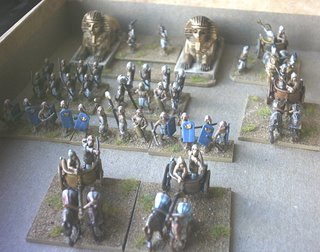






 Turn 5 The Roman centre went in, One rather battered maniple was destroyed straight away, and the phalanx that pursued it smacked into the maniple behind it, to which their general and army standard were attached.
Turn 5 The Roman centre went in, One rather battered maniple was destroyed straight away, and the phalanx that pursued it smacked into the maniple behind it, to which their general and army standard were attached.




